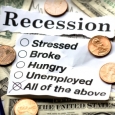Unemployment Insurance
Unemployment insurance (UI) is an essential part of the American social safety net. UI gives laid-off workers time to find or retrain for a new job while ensuring their purchasing power (this is especially important during economic downturns). The federal government first established nation wide coverage with the Social Security Act of 1935. Under this system states play a crucial role, jointly financing and administering the program with the federal government. Generally, benefits last a total of 26 weeks. During recessions extensions are typically issued, although conservatives often attempt to block the legislation.
Commentary
Cry Wolf Quotes
It [this bill] would increase unemployment by aggravating the very conditions which it is attempting to correct, by crippling the agencies which furnish opportunities for employment, by discouraging efforts to relieve unemployment, and by placing a premium on idleness.
New York State’s past independent pioneering activities in social legislation, while commendable in many respects…have already produced discriminatory differentials between the cost of doing business in New York and such costs in neighboring States [sic]. We can see no justification for deliberately increasing those differentials at this time by continuance of such pioneering.
We have just come from another hearing, of the Wagner Labor Board. Now, if you keep piling these things upon industry, where are the reserves going to come from to protect these things? You are going to stop the very recovery necessary to produce this reserve.
…no matter who pays the unemployment insurance bill in the first instance, it comes out of money available for wages and so is all paid by the workers in the long run. But like other indirect taxes, those who bear the burden do not realize in under such a scheme as the Wagner-Lewis bill proposes. If they did, they would be careful how it was spent and would raise objections if slackers and chiselers attempted to love off it. If they thought it was being paid by employers and by the State, many would be tempted to join the slacker and chiseler class. Any bill which purports to lay the whole burden on management (although it cannot be done) is doubly vicious in tendency.
Related Laws and Rules
Evidence
-
San Francisco Fed Finds Unemployment Insurance Doesn't Significantly Contribute to Unemployment Levels
Unemployment insurance doesn't encourage people to stay jobless.
-
Moody’s Analytics Advocates Unemployment Insurance as Stimulus
For every $1 spent on unemployment benefits, GDP increases by $1.61.
-
Congressional Budget Office Says Unemployment Benefits Have Strongest Stimulative Effect
Unemployment benefits make macroeconomic sense during a recession.
Backgrounders & Briefs
Unemployment Policy Brief: Shermer
By Elizabeth Tandy Shermer, PhD, February 2010
Unemployment insurance benefits – including their length, eligibility, and expense – are again in the spotlight. The arguments are hardly new.
Resources
Center for Economic and Policy Research (CEPR) is a progressive think tank that concentrates on social and economic policy, both domestic and international.
The National Employment Law Project is an organization that promotes economically just public policy in the face of the prevailing trends of the law several decades.


